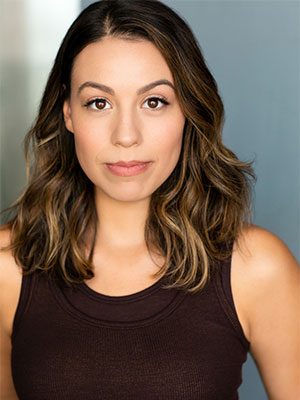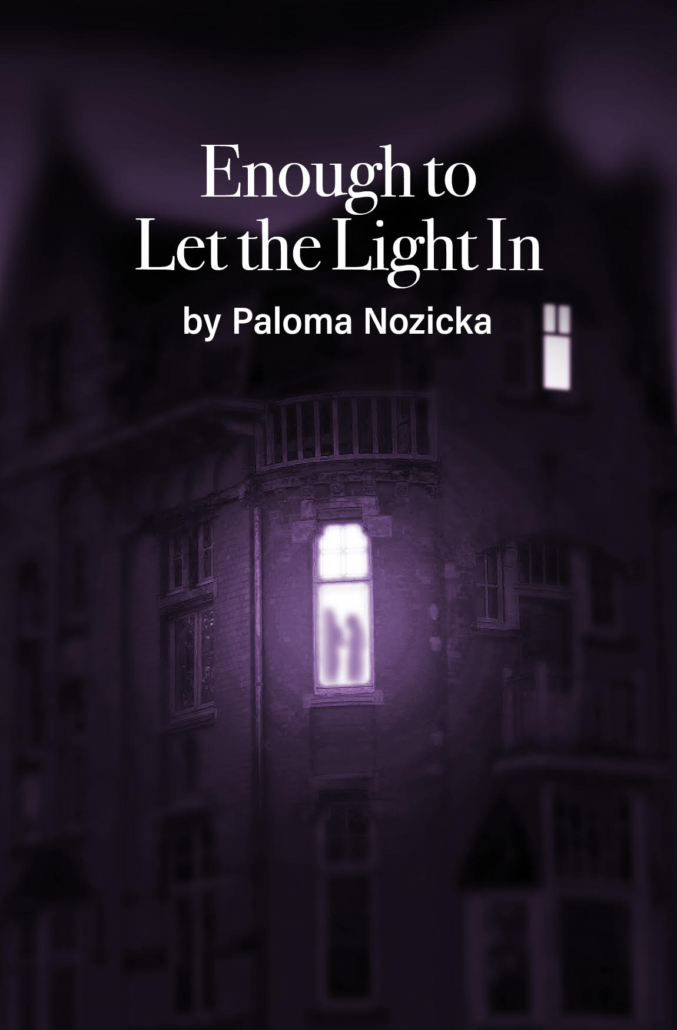Meet Paloma Nozicka
Paloma Nozicka is a Mexican-American writer, actor, and award-winning filmmaker. Plays include Enough to Let the Light In and Both, which is currently in development with the Geffen Playhouse in Los Angeles. Screenwriting credits include “Enough to Let the Light In” (feature), “Horns” (feature), “Each Lovely Thing” (short), “HUGE” (short), “Sam Kelly” (short). Television acting credits include “The Irrational” (NBC); “The Red Line” (CBS); “Proven Innocent,” “Empire” (FOX); “Chicago Med,” “Chicago PD” (NBC); “The Secret Santa” (TLC); “Under employed” (MTV). Nozicka is a member of the the 2023/24 Geffen Playhouse Writers’ Room.
One of the epigraphs at the beginning of your play is: “The people you love/Become ghosts inside of you/And like this/You keep them alive.” Do you believe in ghosts? Do you have ghosts inside of you?
I do. I think a haunting doesn’t have to be a literal ghost. It could be something that refuses to leave you or your mind like the ghost of a person from your past that you never got to say something to; things that you hold so deeply and continue to feel like they are living inside of you.
Have you ever seen a ghost?
Yes, I’ve had some experiences with hauntings, with feeling like there is something at home with me. When I lived in Chicago, I lived next door to a cemetery, and I felt all sorts of stuff coming out of that space. I left town for a long time and when I came back, things had been completely moved around in my apartment. For months, it felt like something had moved into my apartment while I was gone and didn’t want to leave. My response to the ghost was, “Let’s get along. I’m cool if you’re cool. I’m not trying to encroach on your space.”
You have called this play, “a horror story about grief.” Why the horror and why, as you have confessed, “I love horror.”
It’s not necessarily “horror” horror, like body horror. It’s not gory, there’s no blood or murder. It’s more the feeling that something is in the room with you, that you are being watched – you feel so unsettled and upset. I’ve always loved things that ask more questions than they give answers to. I think the horror genre lends itself to asking a lot of questions in a fun, theatrical way. One way we can draw younger audiences to the theater is by doing things that entertains them, as well as gets a message across. If you are a film freak like I am, you know that horror is a genre that both brings people in, and entertains and thrills them.
You have said that this play originally started as a scene: “I was interested in this idea of somebody who is very logical and therapy-forward having a conversation with a very believer-type of person, and how that argument would grow.” Why this interest?
These are conversations that I have on my own mind. I’m constantly picking apart and trying to find holes in an argument when talking to someone. I’m very much like the character Marc in this play. But I also think that there is something beautiful about people who hold very deeply-held beliefs and are steadfast in their beliefs. I wanted to combine all of those things into the conversation between these the two characters in this play.
You have said, “It’s been interesting to me to have this play grow with me as I grow as a person.” How so?
I started to write the play in 2019, which now feels like a million years ago. As I have gotten older, I have grown in my relationships and my profession and I’ve learned a little bit more about grief, loss, and love. The characters deepened because I deepened and could layer onto them more of my personal understanding of the world. The last few years have definitely increased my cynicism, which was already at an 11. What is happening globally and happening personally has created more in-depth characters. They are not necessarily based on me, but are ways that I can express how I feel about the world.
You get inspiration from reading news articles. Is there a recent news article that has inspired you?
I’m part of a theater company in Chicago that does something called the Living Newspaper Festival where we write sort plays based on newspaper articles. That is how I learned to take a very short piece of journalism and use it as a jumping off point for a larger story. I’m able to use my imagination with this seedling of an idea that is based in truth. The world is so strange and interesting – I don’t need to fully fabricate anything.
At the beginning of Jordan Peele’s movie, US, this ominous statement appears: “There are thousands of miles of tunnels beneath the continental U.S. Many have no known purpose at all.” The creepiness of this statement reminded me of the creepiness of your play.
Jordan Peele is a Black artist who is able to combine his experience with his identity with larger-than-life horror stories. I’m Mexican, and I am very appreciative of people who take their experiences as a Person of Color, as a marginalized person, and use them to inform a story that is not necessarily just about that identity. I also think that Jordan Peele is a genius. Get Out is the seminal film of the last 25 years.
Agatha Christie has said, “A mother’s love for her child is like nothing else in the world. It knows no law, no pity. It dares all things and crushes down remorselessly all that stands in its path.” What do you think of this?
That is absolutely true. My mother is a very fierce protector of her children, and I’ve been raised with the understanding that there is no greater love than the love a mother has for her child. That bond cannot be recreated in any other way and is so strong and intuitive that there’s no comparing it to anything else. That bond is unbreakable.
In the United States, we get uncomfortable thinking about death. Do you?
No, because I find it very interesting. It’s the only guarantee that unifies all of us. It’s the only thing coming for every single person whether you want to think about it or not, so why not think about it? It’s the only completely unknown thing to every single human being.
You have said, “To be clear: any story I tell is a Latina story, because I am Latina. I can’t tell stories through any other lens.” The playwright and director, Octavio Solis, has said, “We were here before there were borders, before there were white people. And as artists our task has never changed: to tell the truth. To show us to ourselves.” Is this your goal?
Identity is interesting because a lot of people these days think in the binary – in black and white. It’s hard for them to hold more than one idea in their minds. My dad is white, my mom is Mexican, and I was raised culturally very Mexican, but in a very white suburb outside of Chicago. I can’t tell stories in any other way than I was raised to tell stories – with the identity of the home I was raised in. I must defend myself against people who say, “You’re not writing about immigration. Your plays have all Mexican actors, but I don’t get what this is.” Jordan Peele just doesn’t write about “gangs” but really tries to push the boundaries. People should be able to tell whatever story they want, and it’s important that we see all kinds of people tell all kinds of stories. That’s the only way we are going to be able to expand our understanding of how the world works and how normal everyday people move about the world.
Sandra Cisneros, “Write about what makes you different.” How is what makes you different reflected in this play?
I don’t know if this is what makes me different, but I do know what makes me an artist. I have a lot of empathy. I’m not a religious person, but one of my characters is extremely Christian and I have a lot of empathy for her. I try to understand where people are coming from on all sides of an issue which makes me a little different because I don’t necessarily write people off immediately even if they have a point of view that I don’t necessarily agree with. I try to have a deep empathy for everyone in my plays, especially my characters. I want to know more about why they are the way they are. I want other people to see why they are the way that they are. I’m not a Christian. I’m not a mother. I’ve never lost a child. I’ve never had any of the experiences that the characters in this play have had. I have collected enough knowledge to know, or I know enough people who have had these experiences to feel like I can portray them in play.
If you had one piece of advice about life for a loved one, what would it be?
I am someone who can be so busy trying to plan my next three moves that I am not being present in the life I am currently experiencing, so I think you should try as hard as you can to be present and appreciate where you are currently because life goes really fast.
What is one question you wish an interviewer would ask you?
I can’t think of anything. I’m not one to share more about myself than what is being asked.
What image immediately comes to mind when you hear the word, “family?”
My immediate family. I have an older brother, so I see my mom, my dad and my brother, but especially my brother. My new play is about a sibling relationship so lately that has been heavy on my mind. I love my brother very much.
What image immediately comes to mind when you hear the word, “love?”
Last August, my partner and I had to put down our dog, Kuma, and he was only three. We loved that dog so much. Our dog is the background on both of our phones, and we talk about him all the time. There’s nothing like the purity of love with a pet.


